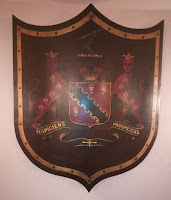The recent gabfest at Glasgow has occasioned a number of "cop"-based puns (a cornuCOPia [bou-boum-tsh-I-thangyou]), but chief among them good cop (Paris) bad cop (Copenhagen). But for some reason I haven't heard the rather world-weary "not much cop".
There has been a welter of podcasts, that I am slowly working through, and in one of the many (I've no idea which) there was an interview with a poacher turned ga... actually, logger turned conservationist in Brazil. As is often the case with non-English-speaking interviews, there was a split second of foreign language answer before a translation cut in.
- a silly pun, based on the very approximate equivalence of logo and "logger"
- the fact that the programme's translation made do with a simple "soon"
<quote_and_thoughts>
"The woman being interviewed was recounting a separation caused by war, but, thanks to some agency, 'Finalement, finalement' she was reunited with her family. The translator said 'Finally, finally', which just about did the job, but it sounded a bit off – not exactly a FAUX ami, but one whom your mother wouldn't invite for tea.
'Finalement finalement' reminded me of Jaques Brel's Chanson des Vieux Amants:And the vieux amants had been together, off-and-on, for a good few years."Finalement, finalement
Il nous fallut bien du talent
Pour être vieux sans être adultes
So the repeating of the adverb of time adds to the emotional impact of the event it modifies. I'm not suggesting that there's some kind of linguistic universal here; I just have the feeling that these two Romance languages (French and Portuguese) behave similarly in this respect – that when you repeat an adverb of time you mean more than just (e.g.) "finally" or "soon".
<quote_and_thoughts>
I wouldn't pretend to be an expert on Brazilian Portuguese, but I suspect that the translation of logo-logo as just "soon" leaves something to be desired.
But what's this got to do with Putin?
In 2003, commenting on Russia's refusal to ratify the Kyoto Protocol (obliging developed and developing countries to reduce greenhouse gas emissions to 1990 levels), Russian President Vladimir Putin jokingly remarked that global warming is not so bad for a northern country like Russia, since “We could spend less on fur coats, and the grain harvest would increase,” but a year later, he signed the law on ratification of the Kyoto Protocol .
Source [That's a Russian-language site, but there's an English button.]
So he did finally sign the Kyoto Protocol, and by 2009 the writing was well and truly on the wall (though it may have been a bit hard to read, given the state of the wall):
 |
| Detail from 2009 photo, Guardian 2016 |
Cracking and collapsing structures are a growing problem in cities like Norilsk – a nickel-producing centre of 177,000 people located 180 miles above the Arctic Circle – as climate change thaws the perennially frozen soil and increases precipitation. Valery Tereshkov, deputy head of the emergencies ministry in the Krasnoyarsk region, wrote in an article this year that almost 60% of all buildings in Norilsk have been deformed as a result of climate change shrinking the permafrost zone. Local engineers said more than 100 residential buildings, or one-tenth of the housing fund, have been vacated here due to damage from thawing permafrost.
Source
In the run-up to COP a Moscow Times article chronicled Putin's switchback ride:
Skepticism to Acceptance: How Putin's Views on Climate Change Evolved Over the Years
During his two decades in power, Putin has gone from joking about the climate crisis to gradually accepting responsibility for responding to climate change as its effects have become more pronounced in Russia, the world’s fourth-largest greenhouse gas emitter which is warming faster than the rest of the planet.




